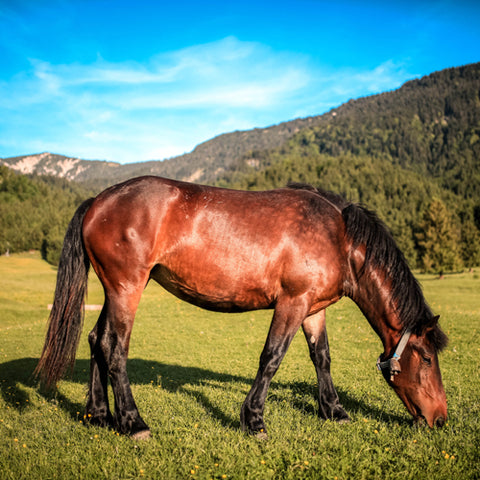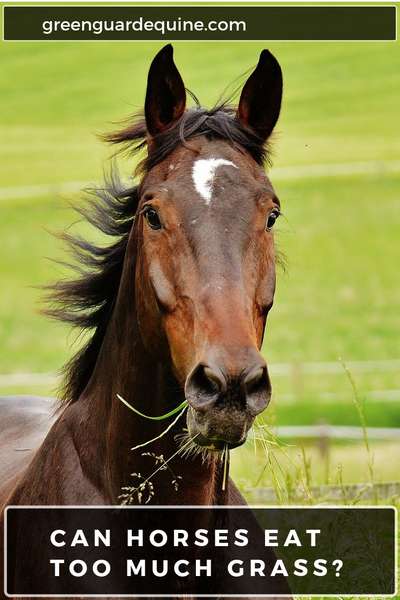Of course he can! Just like he can eat too many carrots, too much hay, too much feed, a horse can certainly eat too much grass. When left to his own devices, I’m not sure any horse will ever push away the plate and excuse himself. It’s very likely that he will become a fat horse! Keeping this in mind, when it comes to pasture grazing, horses tend to go all out. For many horses, there are some extenuating circumstances to keep in mind as you decide how much time to allow your horse to be on grass.
What is your horse’s weight like? Weight gain from pasture and your horse’s overall diet isn’t good for him on many levels. As joints and soft tissues of the legs are stressed, he becomes more likely to overheat, and metabolic disorders are directly related to overweight horses. Insulin Resistance and Pituitary Pars Intermedia Dysfunction (PPID), also known as Cushing’s disease, are two of the common metabolic problems in horses that increase their risk for laminitis and founder.
How much grass does a horse eat per day?
A horse on grass pasture can consume 25 lbs of forage a day! This is the high end of the recommended forage intake of 1-3% of body weight. If your horse also receives supplemental hay and feed, his caloric intake will definitely cause him to pack on the pounds.
What is your horse’s overall health? Older horses and horses with a history of laminitis and metabolic disorders need low non-structural carbohydrate (NSC) value diets. Horses on grass are exposed to varying levels of NSC, and for a compromised horse, those values can trigger laminitis.

A horse on grass pasture can eat 25 pounds of grass a day!
(Photo by Tobi from Pexels)
What’s your horse’s exercise level? The retired horse, the weekend warrior horse, the trail horse and other low-exercise horses can gain weight quickly if they are allowed to graze unchecked. More active and athletic horses can use the extra calories.
What’s your horse’s routine like? Horses are smart, and they know how much time they get to spend on their patch of grass! Researchers found that ponies learned how long they would be allowed to stay on pasture, and could consume a day’s worth of grass in a few hours.
Ways to keep your horse from overgrazing
When it comes to horses and pasture grazing, create a plan for each horse. Gradually increase or decrease the amount of time they spend on pasture. This is important to allow your horse to become adjusted to his diet. Time of year and season are factors that are just as significant, since spring pastures and fall pastures typically have elevated NSC values, so adjusting your horse’s turn-out routine during those times is critical.
For horses that go up in weight at the mere mention of fresh grass, use a grazing muzzle to limit their caloric intake. Muzzles are also suggested for horses with metabolic disorders. There is no reason to risk laminitis if you don’t have to.
Finally, do make time to talk with your veterinarian about your horse’s weight, his metabolic status, and how much pasture time is appropriate for him.There is a lot to learn about laminitis, horse health, and how to keep your friend from becoming a round, fat horse. We will cover more in future articles. Happy grazing!
Liv Gude is the founder of Pro Equine Grooms, a community devoted to the best in horse care.





